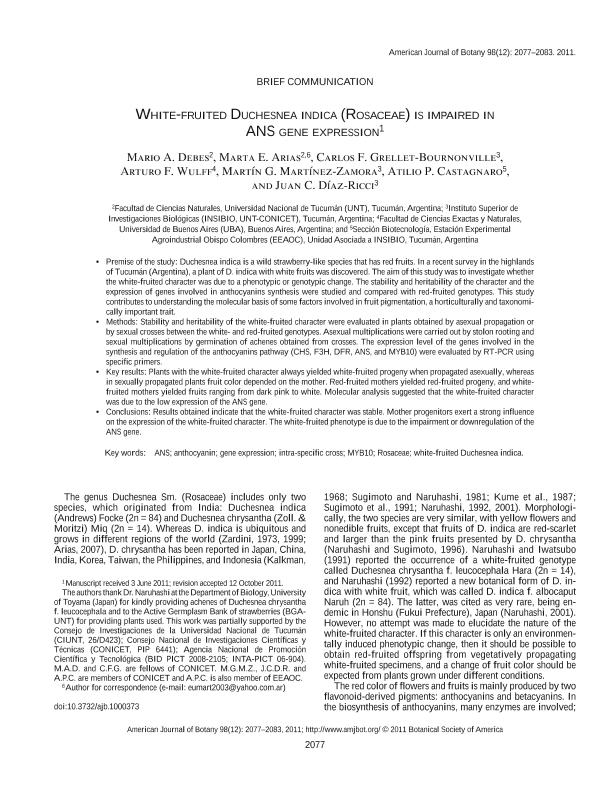Artículo
White-fruited duchesnea indica (Rosaceae) is impaired in ANS gene expression
Debes, Mario Alberto ; Arias, Marta Eugenia; Grellet Bournonville, Carlos Froilan
; Arias, Marta Eugenia; Grellet Bournonville, Carlos Froilan ; Wulff, Arturo Federico
; Wulff, Arturo Federico ; Martinez Zamora, Martin Gustavo
; Martinez Zamora, Martin Gustavo ; Castagnaro, Atilio Pedro
; Castagnaro, Atilio Pedro ; Diaz Ricci, Juan Carlos
; Diaz Ricci, Juan Carlos
 ; Arias, Marta Eugenia; Grellet Bournonville, Carlos Froilan
; Arias, Marta Eugenia; Grellet Bournonville, Carlos Froilan ; Wulff, Arturo Federico
; Wulff, Arturo Federico ; Martinez Zamora, Martin Gustavo
; Martinez Zamora, Martin Gustavo ; Castagnaro, Atilio Pedro
; Castagnaro, Atilio Pedro ; Diaz Ricci, Juan Carlos
; Diaz Ricci, Juan Carlos
Fecha de publicación:
12/2011
Editorial:
Botanical Society of America
Revista:
American Journal of Botany
ISSN:
0002-9122
e-ISSN:
1537-2197
Idioma:
Inglés
Tipo de recurso:
Artículo publicado
Clasificación temática:
Resumen
Premise of the study: Duchesnea indica is a wild strawberry-like species that has red fruits. In a recent survey in the highlands of Tucum á n (Argentina), a plant of D. indica with white fruits was discovered. The aim of this study was to investigate whether the white-fruited character was due to a phenotypic or genotypic change. The stability and heritability of the character and the expression of genes involved in anthocyanins synthesis were studied and compared with red-fruited genotypes. This study contributes to understanding the molecular basis of some factors involved in fruit pigmentation, a horticulturally and taxonomically important trait. Methods: Stability and heritability of the white-fruited character were evaluated in plants obtained by asexual propagation or by sexual crosses between the white- and red-fruited genotypes. Asexual multiplications were carried out by stolon rooting and sexual multiplications by germination of achenes obtained from crosses. The expression level of the genes involved in the synthesis and regulation of the anthocyanins pathway (CHS, F3H, DFR, ANS, and MYB10) were evaluated by RT-PCR using specific primers. Key results: Plants with the white-fruited character always yielded white-fruited progeny when propagated asexually, whereas in sexually propagated plants fruit color depended on the mother. Red-fruited mothers yielded red-fruited progeny, and whitefruited mothers yielded fruits ranging from dark pink to white. Molecular analysis suggested that the white-fruited character was due to the low expression of the ANS gene. Conclusions: Results obtained indicate that the white-fruited character was stable. Mother progenitors exert a strong influence on the expression of the white-fruited character. The white-fruited phenotype is due to the impairment or downregulation of the ANS gene.
Archivos asociados
Licencia
Identificadores
Colecciones
Articulos(CCT - NOA SUR)
Articulos de CTRO.CIENTIFICO TECNOL.CONICET - NOA SUR
Articulos de CTRO.CIENTIFICO TECNOL.CONICET - NOA SUR
Articulos(IEGEBA)
Articulos de INSTITUTO DE ECOLOGIA, GENETICA Y EVOLUCION DE BS. AS
Articulos de INSTITUTO DE ECOLOGIA, GENETICA Y EVOLUCION DE BS. AS
Articulos(INSIBIO)
Articulos de INST.SUP.DE INVEST.BIOLOGICAS
Articulos de INST.SUP.DE INVEST.BIOLOGICAS
Citación
Debes, Mario Alberto; Arias, Marta Eugenia; Grellet Bournonville, Carlos Froilan; Wulff, Arturo Federico; Martinez Zamora, Martin Gustavo; et al.; White-fruited duchesnea indica (Rosaceae) is impaired in ANS gene expression; Botanical Society of America; American Journal of Botany; 98; 12; 12-2011; 2077-2083
Compartir
Altmétricas



